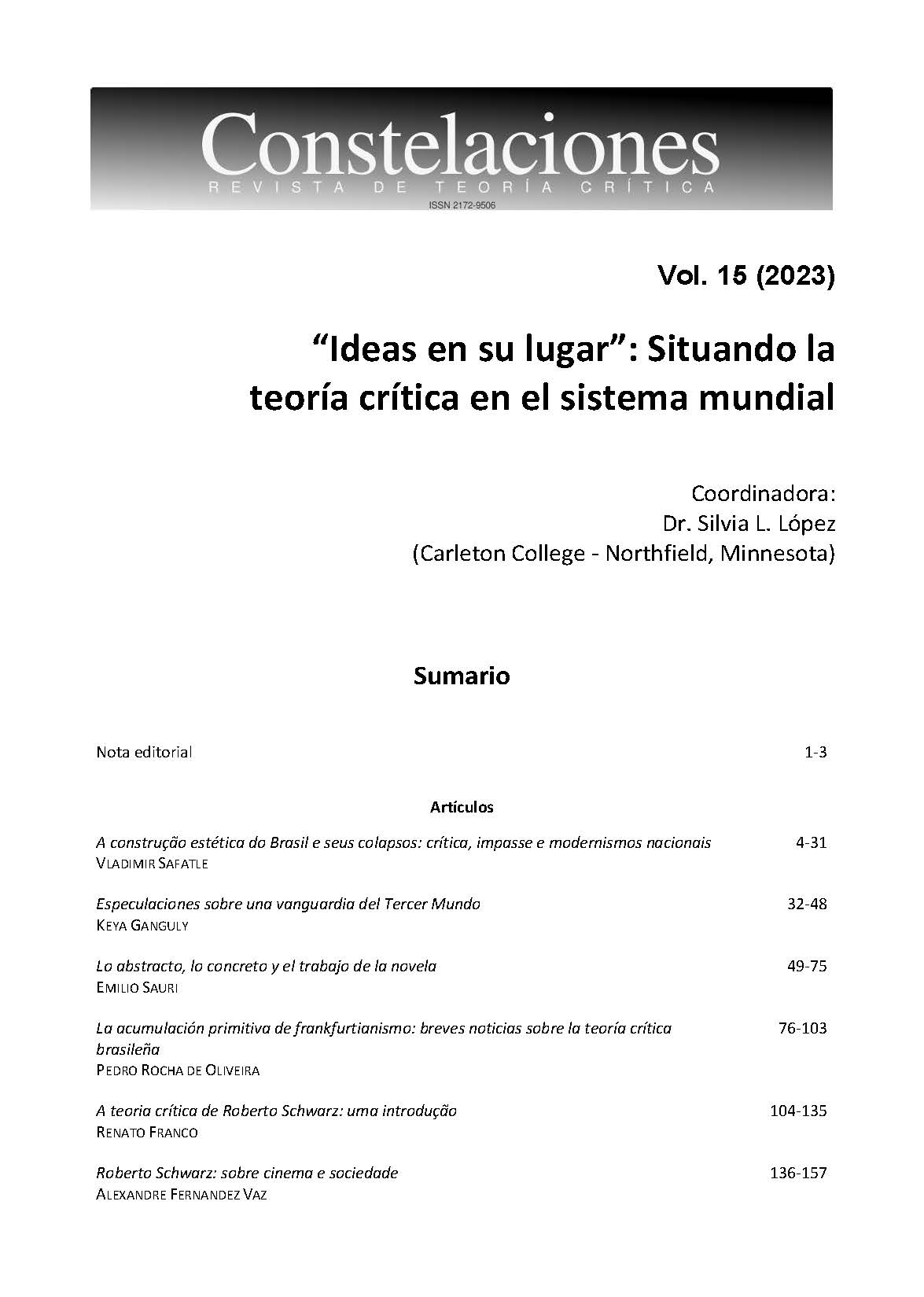Speculations on a Third World Avantgarde
Keywords:
Brecht, Upal Dutt, peripheral avantgardes, experimentation, realismAbstract
If there are those who argue that the European avant-gardes of the twentieth century took their leads from sources outside Europe (Brecht and haiku, Picasso and Africa, or Eisenstein and Mexico, for example), the possibility of a ‘Third-World’ avantgarde as such does not find support in Theodor Adorno’s writings on aesthetic theory or, for that matter, in Roberto Schwarz's discussions of aesthetics. But is there a dialectical perspective from which one might argue for the relevance of the avant-garde as an aesthetic and political configuration relevant to the Third World? In the entirely different space of a reading of Hegel, Adorno (1962) in fact gives us the lineaments for such an argument with the figure of skoteinos, or darkness, the unintelligible, obscurity—which it is the task of criticism to eliminate. Schwarz’s important take-up of Adorno’s themes suggestively circle around the “highs and lows” of self-conscious aesthetic experimentation in places like Brazil, though the task of this essay will be to expand Schwarz’s premises in order to think about the role that experimentation plays in returning the avantgarde to its constitutive mission of bringing art back to life, a mission that I suggest is finally discernible only when the ideal of the avantgarde leaves its modernist entailments behind.
Downloads
References
ADORNO, Theodor W. (1992): “Commitment,” Notes to Literature, vol. 2, edited by Rolf Tiedemann, trans. Shierry Weber Nicholsen. New York: Columbia University Press.
BANDOPADHYAY, Samik (2009): “Introduction,” Utpal Dutt on Cinema. Calcutta: Seagull Book.
BANNERJI, Himani (1998): The Mirror of Class: Essays on Bengali Theatre. Calcutta: Papyrus.
BENJAMIN, Walter (1998): “What is Epic Theatre?,” Understanding Brecht, trans. Anna Bostock. London: Verso.
BHATIA, Nandi (2004): Acts of Authority/Acts of Resistance: Theatre and Politics in Colonial and Postcolonial India. Ann Arbor, University of Michigan Press.
BRECHT, Bertolt (1961 [1934]): Threepenny Novel. London: Penguin.
DUTT, Utpal (2009): Towards a Revolutionary Theatre. London: Pan Macmillan.
EISENSTEIN, Sergei (1988 [1923]): “The Montage of Attractions,” Selected Works, Writings, Vol. 1. Edited and translated by Richard Taylor. London: BFI Publishing.
GUNAWARDANA, J. and Utpal Dutt (1971): “Theatre as a Weapon: An Interview with Utpal Dutt.” The Drama Review: TDR. 15:2 (Spring).
JAMESON, Fredric (2007): Signatures of the Visible. New York: Routledge.
LAL, Ananda (2022): Utpal Dutt: Barricade. Kolkata: Seagull Books.
LÓPEZ, Silvia (2011): “Dialectical Criticism in the Provinces of ‘The World Republic of Letters: The Primacy of the Object in the Work of Roberto Schwarz.” Contra Corriente: A Journal on Social History and Literature in Latin America, 9:1 (Fall).
LUKÁCS, Gyorgy (1964): Realism in our Time: Literature and the Class Struggle. New York: Harper and Row.
MARX, Karl (1976 [1859]): Preface and Introduction to A Contribution to the Critique of Political Economy. Peking: Foreign Languages Press.
POGGIOLI, Renato (1981): The Theory of the Avant-Garde. Cambridge, MA: Harvard University Press.
SCHWARZ, Roberto (2012): Two Girls and Other Essays, Edited and Introduced by Francis Mulhern. London and New York: Verso.
TATLOW, Antony (2001): Shakespeare, Brecht, and the Intercultural Sign. Durham: Duke University Press.
TRET’IAKOV, Sergei (2006): “The Theater of Attractions,” trans. Kristin Romberg, October, 118 (Fall).
WILLIAMS, Raymond (2007): Politics of Modernism: Against the New Conformists. London: Verso.
Downloads
Published
How to Cite
Issue
Section
License
Copyright (c) 2023 Keya Ganguly

This work is licensed under a Creative Commons Attribution-NonCommercial-ShareAlike 4.0 International License.
Authors who have publications with this journal accept the following terms:
1. Authors will retain their copyright and grant the journal the right of first publication of their work, which will be simultaneously subject to the License of recognition of Creative Commons CC BY-NC-SA 4.0 that allows third parties to share, redistribute and adapt the work provided it is for non-commercial purposes and its author and first publication in this journal is indicated.
2. Authors may adopt other non-exclusive distribution license agreements for the version of the published work (e.g., depositing it in an institutional electronic archive or publishing it in a monographic volume) provided that the initial publication in this journal is indicated.
3. Authors are permitted and encouraged to disseminate their work via the Internet (e.g., in institutional telematic archives or on their website) before and during the submission process, which can produce interesting exchanges and increase citations of the published work. (See The Effect of Open Access).
Data confidentiality
1. Constelaciones. Revista de Teoría Crítica guarantees that the data you send us will only be used to meet the requests made in this message.
2. Your data will not be passed on to third parties.
3. You may request that your data be removed from our records at any time.





